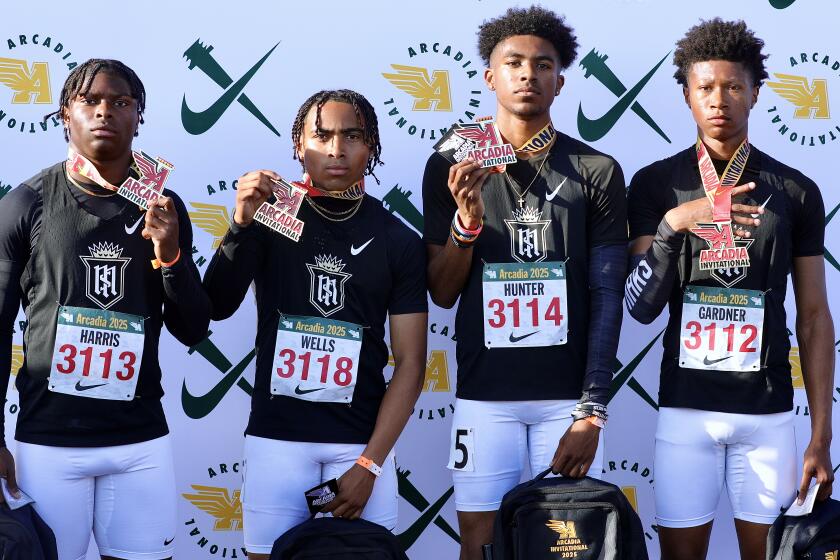Recalling the Babe, Gehrig, Gehringer
- Share via
Memories are stored away, to be drawn upon as a personal bank account. So it is with Joe Cascarella, never a boring braggart but a raconteur extraordinaire. His baseball career didn’t lead to the Hall of Fame, but it’s obvious he was paying attention to what was going on around him.
Cascarella pitched in the major leagues with modest effectiveness for five years and, at age 85, is the last surviving member of the distinguished 1934 All-Star team that toured Japan with such illustrious players as Babe Ruth, Lou Gehrig and Charlie Gehringer.
“It was on our train trip to Vancouver, before we boarded ship, that we stopped off in Chicago,” he remembers. “We were taken to a girls softball game. It was some kind of a promotion. The fans screamed non-stop for Ruth to go up and hit. The Babe finally had to take off his coat, was handed a tiny bat and promptly struck out. Then everybody booed.”
The lesson Cascarella learned was that, yes, even a deity of Ruthian dimensions was subject to a crowd’s changing its affections in one time at bat. But once in Japan, he watched with awe as more than a million Japanese gathered in the streets merely to have a look at Ruth.
The enthusiasm was such that some fans watching from the slopes beyond the outfield fences stayed in their places, sleeping overnight so they would be assured of being there for the next day’s game. “Yes, the Babe had that kind of appeal,” he said.
It was in 1927 that Cascarella, raised in a prominent Philadelphia family, joined Pittsfield (Mass.) of the Eastern League.
“We would hang our clothes on a nail in a tiny dressing room,” he said. “The better players got the longer nails. Most of the players cursed, chewed tobacco and drank. I don’t think I met any Phi Beta Kappa men, but it was an exciting, informative experience.”
Cascarella said after winning 12 games as a rookie with the Philadelphia A’s, he injured his arm. “I kept telling teams I was hurting and couldn’t help them, but the Cincinnati Reds, Boston Red Sox and Washington Senators acquired me,” he said.
He remembers a game in the Polo Grounds, 1938, the Reds playing the New York Giants, the bases loaded and Mel Ott at the plate.
“Manager Bill McKechnie brought me in to relieve,” he said. “You could surmise if I gave up a hit it would be reason to let me go since Warren Giles, the general manager, brought me there. Using a right-hander against Ott was tantamount to suicide.
“I nearly asked for my mother’s prayers. All a right-hander can do is come over the top with a curve ball to a left-hander. You can’t go side-arm because you give him a chance to put the full bat on the ball. Ott had to know what I was going to do.
“I threw the curve and he hit the first pitch straight up. Ernie Lombardi caught it. You should have heard Bill Terry, the Giants manager, and how he was screaming at me. Lombardi said, ‘Don’t talk that way to the Count (a Cascarella nickname) or you’ll get trouble from me.”
Cascarella remembers another time when Lombardi came to the rescue of teammates Billy Myers and Whitey Moore in St. Louis. An American Legion convention was going on and some of the old soldiers were at the Chase Hotel. They invited Myers and Moore to a party that evolved into a rigged dice game. Lombardi was summoned to get their money back, even if he had to establish his presence in a threatening way.
And then there was Gehrig at the batting cage. “He came up and said, ‘Joe, I’ve been to an opera. Can you imagine? I’ve been to an an opera.’ I guess he realized I understood music and he wanted to talk about it. His wife, Eleanor, taught piano.”
The worst baseball battle he ever witnessed was on a road trip while in the Pacific Coast League. He saw Babe Pinelli, later a National League umpire, resent ethnic remarks from Red Wingo.
“It happened on a train, and it’s a good thing Pinelli, a wonderful individual, was pulled away or it could have been a lot worse for Wingo,” he remembers.
Cascarella always has a different way of conveying how Gehringer, a picture swinger, welcomed his appearance. “Charlie insisted on a chauffeured car picking me up and getting me to the park on time,” he said. “He didn’t want anything happening to me until he went 3-for-4.”
And so the pleasurable anecdotes unfold as Joe Cascarella, a man of culture who once played a tough game when money was hard to come by, describes a segment of baseball’s past that isn’t chronicled in the record books.
More to Read
Go beyond the scoreboard
Get the latest on L.A.'s teams in the daily Sports Report newsletter.
You may occasionally receive promotional content from the Los Angeles Times.










